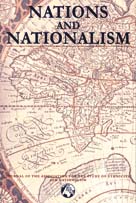No CrossRef data available.
Article contents
A reply to Farrar, Jr, McGuire and Thompson on ‘Dog in the night: the limits of European nationalism 1789–1894’
Published online by Cambridge University Press: 01 April 2000
Abstract
In ‘Dog in the Night: The Limits of European Nationalism 1789–1894’ Farrar, McGuire, and Thompson question the role of nationalism as a political prime mover (Farrar et al. 1998). A postmodernist objection to grand narratives may lie behind their critique, but the case is put through a more conventional examination of the historical record. The writers select seven events for scrutiny, divided into two types. The first comprises happenings of a broadly popular, history from below kind: the French Revolution, the German response to Napoleon, the German Revolution of 1848 and the Eastern Crisis of 1875–8. The second group of events is more orientated to international relations, and thus the events looked at – the Crimean War, Bismark's alliances and the Franco-Russian Alliance of 1894 – are less likely to have been driven by popular concerns as opposed to state interests. Nevertheless, Farrar et al. argue that given the alleged pervasiveness of nationalism at the time, the events ‘could be expected to reveal it’ (1998: 548). Their basic method is to identify historians who appear to give a determinant, or at least a central, role to nationalism as the historical motivator of the various events, and then to question whether or not it in fact was. In each instance they suggest that contrary to the view that nationalism was a key force in nineteenth century politics, it was marginal relative to sectional and material interests. It was, as it were, an absent player on the nineteenth century European stage, in the very era in which it was thought to have become so dominant.
- Type
- Research Article
- Information
- Copyright
- © 2000 Association for the Study of Ethnicity and Nationalism




